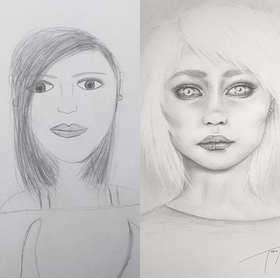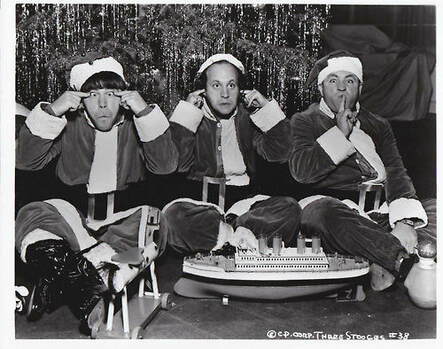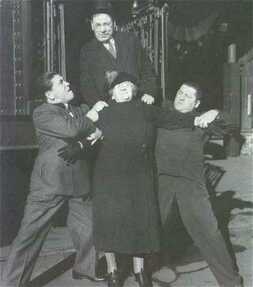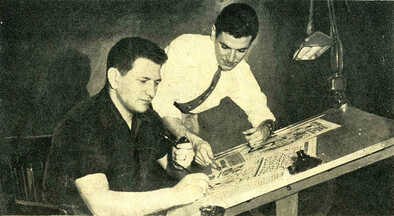|
Okay, so here’s the thing, and this may come as a shock but: You do not have to hate what you make. You don’t even have to be modest. You don’t have to ask for pennies when you’re making gold. I know, it’s hard. I’ve had my times where I started drawing and I couldn’t make a goddamn line come out right. I’ve stared at the flashing type line on my computer countless times, unable to figure out what comes next or how in the world to get this out right. I’ve gone back and looked at things I thought were great, only to find they were far from it. But the thing is, in general, I don’t hate what I make. I love most of it. People come up to me and they feel a desperate need to tell me how good I am at writing or drawing, and don’t get me wrong, it’s great, but it’s also like they expect me not to think it. It’s nothing on them—it’s this idea drilled in that you can’t love what you do, that you always have to be struggling and striving and hating yourself, and you’re a dick if you say otherwise. That, my friends, is How to Keep Others Down 101. Look, nothing is ever going to be perfect. I should know—I’m often a perfectionist. I know everything wrong with what I make, but I also know everything right. That is what you focus on, and you take the wrong, you learn from it, and you do better next time. But that does not mean the first time sucked. I’m tired of people thinking that they’re not talented, that their art isn’t good enough, no matter what everyone else says—even in spite of what everyone else says. That’s the desperation I hear in people’s voices: It’s from all the artists who just wouldn’t listen. I’ve been on the giving side. I’ve seen it, and man, it’s brutal when you know someone’s got talent and they just can’t, or won’t, accept it. Maybe the fear lies in this: If you like it and no on else does, then there’s something innately wrong with you, right down to your tastes. So, if you don’t like it and others don’t, then you were right all along. But who the hell wants to be right about that? We’re making art. Not everyone is going to like it, and you know what? That’s fuckin’ fine. No one has to, as long as you do. You are your first viewer, first critic, first audience member. If you were in that position with someone else, how would you be? Nice, probably. Your criticism would be constructive, supportive—you’d find the good things first and you’d point them all out. So, why don’t you do that with your own work? Do it. Even if others don’t like it, you will, and once you decide enough times that you’re good or that thing you did was good or that part or whatever it is, you will build armor from that point on, and if other people don’t like it, you won’t give a fuck. You’ll know it’s good, and nobody is going to tear you down. And guess what? That’s not cockiness. It’s power. You can’t expect everyone to support you, not in this bullshit internet world where everyone has an opinion they know nothing about. Trust me, you know better than they do. Go make art, go love the art you make, thank the ones who think so too, and fuck the rest. You didn’t make it for them, anyway.
0 Comments
Growing up with The Three Stooges as my family has pointed out something to me: the immense, age-defying, life-changing effect that you can have on people. We’ve all witnessed that, I’d imagine, with celebrities we admire and artists and philosophers. We’ve seen what one man/woman can do (David Bowie, JK Rowling, Stan Lee…), but it’s distant. We are the effect of it, or maybe we’ve witnessed it, but we haven’t all created it. For me, I’ve been a conduit for that effect. I have watched people light up and laugh and become filled with love and nostalgia just because I said that my great-grandfather was Moe. Men, women, strangers, friends, young, old… It’s like wielding a little bit of old, inherited power. “You made my day,” I’ve been told. The Three Stooges were Jewish men in a time when parts of the world hated anything Jewish. They were their own kind of funny—an iconic kind of funny. They could be appreciated by anyone. They struck something, something I don’t think people strike often these days. Their humor needed no language. You could see it, quite literally. But it was more than that. They loved what they did, and so did others. Myself included. And they knew. That’s the thing. I can’t speak as much for the other guys, but my dad told me that Moe would keep photos and things in the trunk of his car, so if ever he got recognized, he would have something to sign and give to them. That’s a kind of appreciation often lost these days. They knew what they had. They knew what that meant. “I recall that every Christmas my dad played Santa to the children at an organization called the Spastic Children’s Guild. These were young children with spastic paralysis. Moe would go to downtown L.A. and haunt the wholesale houses. These were places owned by fans and people he knew from Brooklyn days. He would ask everyone he contacted to donate toys, clothing you name it. As payment for the donations, he’d tell a joke and have the donors in Stooge stitches. My dad was always concerned about helping “the underdog.” He would always say how lucky he felt to do what he loved to do and make a living while doing it.” – Joan Howard Maurer, my grandmother (read the original article here) Despite the slapstick violent humor, that’s the kind of person he was. He saw the other side. He knew who was watching, and he cared too. I think that’s part of why they’ve endured so well. I forget sometimes about the other side of art. I’ve always tried to be vocal about what I do, and about the fact that you just have to write and keep writing. Some of the younger friends I had back in my teens would come to me for advice—and they still do. They remember from back in the day. New ones too. And you know what? That’s so cool. Not everyone can say that. It’s no Stooge-level impact. I will never be exactly what they were (which is totally fine), but I can see a small power forming, a small ability to impact other people. It’s all the more reason and motivation to continue. I’ve come this far, and I’m starting to see that there are people on the other side of my art. I recognize that I’ve set myself up as someone who is going to “do things”. I can see it already, thanks to the Stooges and the stunning effect they created, and I know it is no small thing to matter in someone else’s world. I want you to take a good look at that title. Starving artist. That romantic, brooding musician who sleeps on a couch and has holes in his clothes and drama so high he’ll probably write in blood. That struggling actor who lives in his car and works three shit jobs and runs on Adderall. The waitress with dreams that can’t catch a break. The writer who just can’t make a deal fly and is bitter of trying, like it almost makes it better to have failed. I’ve seen it. I grew up with it all around me in Los Angeles. You could call it a side effect of hustling, of drive, of perseverance. We all know it. We’re meant to live it—prideful to accept it. It excuses the failure, the pocket change exchange, the short on rent and sleep. Chase the bitterness with alcohol. Laugh at the narcissism with a side of self-doubt and nothing for dinner. But take another look: starving artist. Not aspiring but starving. Not trying. Not climbing. Not up. I’ve seen it romanticized, idolized, held onto like a badge of pride. Scars. Tattoos. Holier than thous. You’re tough. You’ve earned it. Hell, you don’t even want success, anyway. You’re right by being wrong. You’ve beaten the system, right? Who fed that bullshit to you? You were slung an insult and you took it like a truth. Experience has value, and so does drive. Bloody your knuckles and bloodshot your eyes until the sun comes up, and if it doesn’t work, do it again. But there’s still a lie. There’s still something not quite right. As much as society loves art, it shits on the artist. “Get a real job.” “You contribute no value, but I’ll pay $15 to see your movie and claim I can do better.” And the best: “Can you do it for free?” and the anger that ensues when you won’t. Starving artist. That’s what they tell you. That’s what they want you to be. Why? Because if you think it’s the dream to starve as an artist, that it’s just “part of the struggle”, then they have you. They own you, and they don’t have to feed you. They can keep you down, because you think you gain meaning from squalor. That’s the dark dream, the life you have to live, or success can’t be real. You can have millions but be an addict. You can have billions and want to die. Why? Because you were taught to be starving. You were taught that you don’t deserve to have more, that you have to suffer and starve for it. You were never meant to break out of the 9-5 ‘til you die life. You were taught to fail, even when you have success. Artists are supposed to starve, right? You’re not the breadwinner, right? Fuck. That. You are the light in the dark. You are the music in the silence. You are the words no one else could say. You are the mirror. You are fucking magic, creating something out of nothing. You are terrifying, because you can change everything. Don’t sell yourself short, because the rest of the world would love to, and they'd be happy to see you starve. They'd be right all along. Don’t buy the toxic fantasy they sold you. It wasn’t made by an artist. Starving artist. Bullshit. My name is Tessa Maurer. You probably haven’t heard of me, but there’s a very high chance that you have heard of my family. My great-grandfather was Moe Howard of The Three Stooges, and his bros, Curly and Shemp Howard, were my great-uncles. Wild, I know. You don’t know how strange it is to have a pencil growing up with your great grandfather’s head carved and bulging on top of it, to turn on the TV and every other comedian mimics your great-uncle. It’s surreal, when I stop and think about it. Mostly, it was absurdly normal. Laughably so. My family history is a Google search away. I can find my great-great grandfather’s photos online. I can ask Siri how old my grandmother is if I forget, which I have. What the hell, right? I was born to a family of artists—painters, writers, actors, musicians. In that regard, I was lucky, but I was also stubborn, so either way, I would have become an artist. It’s intrinsic. It’s always been there. That isn’t luck. There was nothing really to “become.” It hasn’t all been fun and fame. There was a lawsuit back in…1994? We lost the bulk of our rights to a replacement Stooge’s family. I'm told that laws were made as a result of that suit to prevent it from happening to families in the future. Too late, of course. It was and is our legacy, and yet we don’t really control it. I'm not here to point fingers or stir anything up. Still, I’ve known how unfair the world can be since I was a little kid. Maybe someday, somehow, it’ll change. I hope so. I always have. My grandfather, Norman Maurer, was a writer, comic book illustrator, producer… I’ve heard he was the youngest person to make comics. He was 12 or 13, I think. He and his brother, Leonard, along with his bud Joe Kubert, invented 3D comic books. Unfortunately, he died of lung cancer in 1986 at age 60. I was born in 1992. I’m told he would’ve loved me. And closer to home, my dad was and is a freelance screenwriter. He’s worked on countless things for countless countries, but when you’re a freelance writer, work and money are not consistent. So, while I grew up with MASSIVE success a few generations away, I also grew up with money worries and woes close to home. In my home. And I knew that things were fickle, that the entire mountain you built from nothing could become someone else’s. I learned that movie deals fall through—more than half my life of falling throughs. This gives me two options, right? I can either say “fuck it” to all the bullshit, all the downs with the ups, and ride that passion in my blood, knowing that if they can do it, I can. Consequences be damned. Financial fears be damned. Or, I can get a job—a 9-5, write in my spare time, and most likely slowly decay. That’s probably the easier route. I would be “safe.” I would be adequate. Maybe someday I’d be more. Maybe. When I was younger, I had the idea that you should only write (or do art) on the side. That you should have something "stable" to catch you and save you. But doesn’t that mean you don’t have to have success? That you don’t have to write and draw and make art to live? Doesn’t it stop being vital and start becoming…optional? Forgettable? Secondary? Wasn’t gonna fly for me, and it still isn’t. Once I started writing, I knew I had to do something with it. I knew I could make something of it. My current circumstances allow me to keep creating as my primary function, but I can feel the pressures of life welling. The ease makes it easy to let my dreams be distant things—things that I don’t have to push for, and the looming financial dooms if I don't make it go right light a fire I often want to jump away from and pretend isn't there. I should push. I want to. I’m trying to. Other people are probably trying more, but they aren’t me, and that’s something you should never forget. No one else is you. My family did it. So can I. But I’d do it anyway, even if none of them existed. I am an artist. I am a writer. It’s at my core of cores. It is my anchor and my guide; it is my fear and it is my love. I have that added push, though, that name to live up to, that extra spark in my blood. So, I have to get my life together. I have to be what I’ve invested 13 years into. I have to make you know my name, too. Hang on. It’s probably gonna be a bumpy ride. |
AuthorTessa Maurer Archives
April 2020
Categories
All
|




 RSS Feed
RSS Feed
